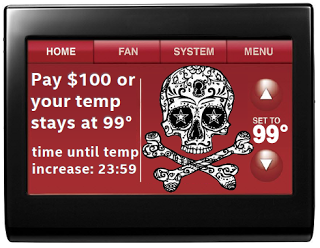By Jen Hyde, Freshmade
 Imagine arriving home and walking to your door. You push the key into the lock and click, it swings open. Stepping inside, you feel warm. Too warm. Maybe the air is broken. You realize that's not the case when you read the message on the thermostat: Pay $100 or your temp stays at 99'.
Imagine arriving home and walking to your door. You push the key into the lock and click, it swings open. Stepping inside, you feel warm. Too warm. Maybe the air is broken. You realize that's not the case when you read the message on the thermostat: Pay $100 or your temp stays at 99'.
You've been hacked.
With the rise of smart devices, hacking the Internet of Things (IoT) is becoming more attractive to bad actors. Security companies have demonstrated how Internet-connected thermostats can be hacked to gain control of other devices in your home.
It's simple, really, explains Bruce Snell, Cybersecurity and Privacy Director at Intel Security. Once criminals have your wifi access point, they have access to all your devices. All are hackable and interconnected.
And cyber criminals don't just want your credit card number. That information only goes for about $1 on the black market. Instead, they want your patterns. They want your patterns so they can build a profile to be used for identity theft or phishing.
So who are these hackers?
' Nation states have the time and materials to put into hacking.
' Organized crime groups use existing malware to launch attacks.
' Hacktivists such as Anonymous attack systems based on a political/ideological bias.
' Script kiddies don't really have the skills, but they know how to get tools and launch attacks.
Malware and ransomware are trending up:
' Ransomware: up 120% over last year
Ways To Protect Yourself
For smart devices, Intel Security advises:
' Update your router to secure your WiFi network; disable guest network access.
' Know which smart devices you have in your home and how they're connected.
' Buy smart devices from trusted brands with high levels of security.
' Install security software on mobile phones and tablets.
Also, mind those passwords. The Verizon Data Breach Investigations Report showed 63% of data breaches involved weak, default, or stolen passwords. The #1 most common password? '12345', followed by 'password' at #2. 'starwars' makes the list at #25.
For more tips, visit intelsecurity.com.
Image by Bruce Snell
Also, mind those passwords. The Verizon Data Breach Investigations Report showed 63% of data breaches involved weak, default, or stolen passwords. The #1 most common password? '12345', followed by 'password' at #2. 'starwars' makes the list at #25.
For more tips, visit intelsecurity.com.
Image by Bruce Snell
